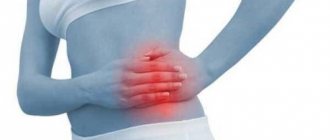Heartburn is an uncomfortable, painful burning sensation behind the sternum, in the upper abdomen, spreading upward to the neck and throat. It may worsen after eating in a lying position (especially at night), when bending forward or physical activity, and last from several minutes to several hours.
Heartburn is caused by the entry of stomach acid and other stomach contents (enzymes, bile acids) into the esophagus and their effect on its mucous membrane. This occurs due to insufficiency of the lower esophageal (cardiac) sphincter and, accordingly, reflux and regurgitation - the movement of stomach contents in the direction opposite to normal.
The appearance of heartburn can be associated with many different conditions and conditions: gastritis, gastroesophageal reflux disease, hiatal hernia, eosinophilic esophagitis, gastric and duodenal ulcers, functional indigestion, pregnancy, eating habits, taking certain medications (anti-inflammatory drugs, aspirin). In addition, gastric juice and bile acids that damage the mucous membrane of the esophagus can contribute to the formation of ulcerations on the mucosa and cause precancerous changes (Barrett's esophagus).
Heartburn may be accompanied by belching, bloating, dysphagia, and nausea.
Causes of heartburn
The most common causes of heartburn, in addition to the medical and other conditions listed above, include:
- lifestyle (overeating);
- foods and drinks (spicy foods, citrus fruits, onions, tomatoes and their derivatives (for example, ketchup), peppermint, chocolate, carbonated drinks, alcohol, coffee);
- fatty and fried foods;
- lying on your back immediately after eating;
- overweight;
- smoking;
- high levels of stress;
- wearing tight clothes, belts.
Heartburn in pregnant women
12.10.2021
The symptoms of heartburn have many similarities to the symptoms of a heart attack. For this reason, many people panic when they experience a burning sensation in their chest . This article will go into more detail about the symptoms that women experience when this disease occurs. Heartburn is also known by other names such as gastroesophageal reflux disease ( GERD ) and acid reflux disease.
The burning sensation is caused by hydrochloric acid present in the stomach . This acid is necessary when digesting food. Studies have shown that women suffer from this digestive problem to a greater extent than men. Levels of hormones that promote digestion are more likely to change in women. Pregnant women in particular and women with a hiatal hernia , or bulge in the upper part of the stomach , are prone to this condition.
Symptoms
Symptoms most often occur at night. The most common symptom is a sharp burning sensation that emanates from the base of the throat to the other end of the sternum. Usually this discomfort goes away within 20-30 minutes, but sometimes lasts for several hours. Heartburn tends to get worse when bending over, lying down or sitting.
- Also, the patient’s condition with heartburn becomes more unpleasant during eating and sleeping. A sour taste is felt in the mouth due to reflux of stomach acid and often spreads to the back of the throat .
- At the same time, the person begins to experience nausea . Many women who suffer from heartburn also experience a sore throat . A sore throat , in turn, causes coughing and pain when swallowing. Some women experience strange discomfort, as if food particles are stuck in their throat .
- Another symptom is a feeling of fullness , which causes patients to lose interest in eating. Heartburn can happen at any time during pregnancy , but its likelihood increases significantly in the second and third trimesters. This happens because at this time the uterus is growing and this puts a lot of pressure on the stomach .
- Another factor that causes heartburn in pregnant women is an increase in the level of the hormone progesterone. During pregnancy this hormone is responsible for weakening the muscles of the lower esophageal sphincter, which are located at the junction of the esophagus and stomach . The sphincter muscle prevents the backflow of stomach acid. When it is relaxed, much more gastric juice enters the esophagus and this leads to heartburn .
- The burning sensation mainly starts in the chest and extends to the throat . When the burning pain is limited to the heart , it may be associated with eating spicy foods.
- Some pregnant women also complain of arm pain .
- Other associated symptoms include sweating back pain .
Treatment
- Drinking a glass of water is the easiest way to relieve the annoying symptoms of GERD .
- Many women find great relief from chewing gum as it promotes the production of saliva in the mouth , which contains bicarbonate. Bicarbonate in saliva neutralizes gastric acid secreted by the stomach .
- Antacid is considered the best medicine for treatment.
However, there are antacids that lead to side effects such as constipation and diarrhea . Therefore, before using any medicine, you should consult your doctor . Pregnant women should strictly adhere to the consumption of antacids containing iron, magnesium or calcium. They should choose natural medicines for themselves. For example, drinking a cup of herbal tea or chewing a small piece of fresh ginger root can relieve discomfort.
Any woman who suffers from heartburn should follow a diet that avoids spicy, fried foods and caffeine. Instead of filling your stomach with food at one time, you need to eat small amounts of food regularly. Excessive fluid intake during meals is not a good reason. Walking after eating helps prevent heartburn .
Heartburn cannot be completely eliminated in pregnant women, as it is caused by hormonal changes and the growth of the uterus . However, with proper nutrition, symptoms can be controlled even very effectively.
Excess acid in the esophagus can lead to more serious conditions such as bleeding from the esophagus and even ulcers or scars in the area. If a woman is constantly worried about the above-mentioned symptoms, she should consult a doctor for proper treatment.
Published in Pregnancy and pregnancy management Premium Clinic
Which doctors should I contact about heartburn?
To determine the causes of heartburn, diagnose the condition and treat it, you need to contact a gastroenterologist.
Heartburn, which occurs infrequently, can be controlled with lifestyle changes and over-the-counter medications that neutralize acid and normalize stomach acid. Lifestyle modification is based on eliminating certain foods and drinks (heartburn triggers) from the diet, quitting smoking, losing weight (if you are overweight), eating smaller meals (5-6 times a day, in small portions), eating meals no later than 2-3 hours before bedtime, avoiding bending forward after eating, reducing stress.
Caution: Frequently recurring episodes of heartburn may indicate the development of a serious pathology.
If you use an over-the-counter heartburn medication more than 2 times a week, your heartburn lasts more than 3 weeks, gets worse, and symptoms include difficulty swallowing, difficulty breathing, cough, hoarseness, blood in your vomit, black stools, unexplained weight loss, Immediately consult a gastroenterologist, a specialist will diagnose and develop an individual treatment plan for your disease.
Author:
Amelicheva Alena Aleksandrovna medical editor
Gastroenterologists recommend sleeping on your left side
Author:
medical editor Mazeina Ekaterina
1 minute
5282
Gastroesophageal reflux disease (GERD) is widespread throughout the world, and in developing countries the number of patients is increasing every year. The unpleasant symptoms of gastroesophageal reflux - heartburn, hiccups, vomiting, a feeling of acid in the mouth, sour belching, pain behind the sternum - seriously impair the quality of life and negatively affect a person’s daily activities.
Gastroesophageal reflux disease (GERD) , often also called reflux esophagitis, occurs due to the regular reflux of acidic stomach contents into the esophagus and damage to the lower esophagus under the influence of hydrochloric acid and the protein-digesting enzyme pepsin.
Scientists say that 80% of patients with GERD experience painful symptoms at night, and this negatively affects the quality of sleep. Previous studies have shown that sleeping on the right side is associated with longer exposure to hydrochloric acid in the esophagus compared to sleeping on the left side. But these experiments had serious limitations - a small sample and not entirely correct conditions, since they were carried out during the daytime.
The aim of a new study, conducted by scientists from the University Medical Center of Amsterdam, was to study the effect of spontaneous sleep positions on the occurrence of nocturnal gastroesophageal reflux by studying esophageal motility and monitoring body position.
Causes of GERD
Usually this is damage or functional failure of special obturator mechanisms located at the border of the esophagus and stomach.
Factors contributing to the development of the disease are stress, work associated with a constant downward tilt of the body, obesity, pregnancy, taking certain medications, fatty and spicy foods, coffee, alcohol and smoking. According to this study, published in the February issue of the American Journal of Gastroenterology, sleeping on the left side is associated with shorter exposure to acid in the esophagus and faster clearance of acid from the esophagus. The experiment involved 57 patients with gastroesophageal reflux.
The experts found that, compared with the right side position and the supine position, the acid exposure time on the left side was significantly shorter (median 0.0% vs. 1.2 and 0.6%, respectively). In addition, the time for acid clearance from the esophagus in the left lateral position was much shorter compared with the supine and right lateral positions (median 35 seconds versus 76 and 90 seconds, respectively).
Read all about gastroesophageal reflux disease in the Encyclopedia on MedPortal.
Read the article
The authors emphasize that the findings provide support for interventions aimed at promoting left-side sleeping to improve patients' symptoms of reflux and nocturnal esophageal acid exposure.











